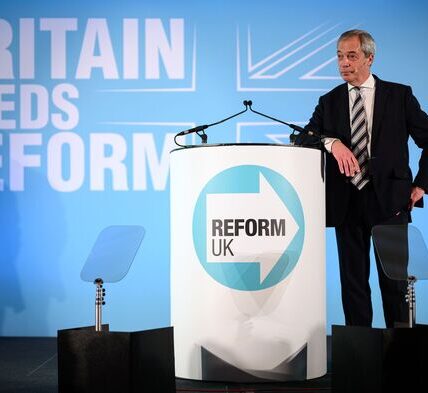EXCLUSIVE: British flagmakers are seeing unprecedented demand as Operation Raise the Colours sweeps the country.

Sales of England flags have gone through the roof since the Raise the Colours campaign was launched (Image: Getty)
Business for flagmakers across the country has been booming as patriotic Brits snap up national flags to show their contempt for councils tearing them down. The St George’s Cross has been the biggest seller over the past week, with the Union Jack not far behind with retailers the Express has spoken to reporting a huge uptick in demand.
Brian Speed, owner of The Flag Shop based in the Midlands, said his business had gone from selling flags in the tens each week to flogging hundreds and that he was “unusually busy” during what is normally a quieter period over the school summer holidays. Referring to Union Jacks and St George’s flags, he explained: “Usually, these sorts of flags this time of year, you’ve got a few going out, but I’ve been selling them by the hundreds this week. There’s been a lot going out this week compared to what it would normally be.”
A colleague added: “We’ve seen a massive increase in the purchasing of the St George’s flag, and the Union Jack flag. Mainly, I would say St George’s flag, but the Union Jack flag as well.”
Another British company, Flagmakers, which typically supplies high quality flags on a smaller scale to businesses, has also seen a sharp rise in demand. “The last few days, it’s gone up a lot,” said marketing manager Simon Butterworth. “It’s quite significant.”
It normally sells more Union Jacks but Mr Butterworth said: “Over the last few days we have seen a large increase in national flag sales, in particular the St George’s flag.”
Normally, they would only sell around ten a month, but he confirmed they had sold 25 this week.
The surge comes as an online campaign to line the streets with British flags, Operation Raise the Colours, gains momentum across the country.
It appears to have been triggered by Birmingham City Council removing flags from lamp posts for safety reasons.

Birmingham City Council has removed flags tied to lampposts on safety grounds (Image: Getty)
Another seller, who asked to remain anonymous, told the same story, saying they have been inundated with orders, particularly for St George flags.
However, some requests had to be refused because of offensive requests to go on the flags, which they said included racist comments.
“Some of them are quite terrible, what people want to put on them. It’s not just plain Union Jacks, you know, there’s a lot about Starmer and there’s a lot about different things and immigrants and things like that,” he said. “We have to refuse an awful lot.”
Operation Raise the Colours can be traced back to July, when many St George and Union Jack flags were flown to celebrate the Lionesses’ historic win at the Euros.
The number of flags began to grow and people shared images online of flag-lined streets in Birmingham’s Weoley Castle and Northfield neighbourhoods. A group known as the Weoley Warriors took credit, saying they wanted to honour English pride and history.

A mini-roundabout in Druids Heath, Birmingham with a St George’s flag painted on it (Image: Emma Trimble / SWNS)
However, Birmingham City Council warned residents to remove flags from lampposts on August 15 for safety reasons while maintenance work took place.
“People who attach unauthorised items to lampposts could be putting their lives and those of motorists and pedestrians at risk,” a spokesperson said.
A number of people questioned the council’s reasoning on social media, and many were furious that Palestinian flags had not been removed.
Days later, council workers were pictured taking flags down in Tower Hamlets, London, prompting fury.
Since then, a social media movement called Operation Raise the Colours has been dedicated to lining the UK’s streets with British flags.
Flags have appeared all over the country, a number of GoFundMe pages have been set up to support the campaign, and people have also been pictured using ladders to fly the flags as high as possible. Mini-roundabouts and zebra crossings have also been painted over with St George’s crosses.
However, critics of the movement claim it has divisive undertones, especially during a time of tension in the UK around immigration.
Sabiha Aziz, a local campaigner from Acocks Green, told the BBC it was a “crying shame” that the “far-right” had exploited the flags, so that they “symbolise hate and division”.
Downing Street, however, has backed the flying of national flags, although it didn’t comment on individual cases.
Sir Keir Starmer‘s official spokesman said: “The PM has always talked about his pride in being British, his patriotism… patriotism will always be an important thing to him.”
The government’s own guide to flying flags states it “wants to see more flags flown, particularly the Union Flag, the flag of the United Kingdom – it is a symbol of national unity and pride”.
In England, council legislation treats flags as advertisements to ensure they do not impact safety, but the flying of the Union Jack or St George’s Cross does not require formal consent.
However, it states that all flags must “have the permission of the owner of the site on which they are displayed,” which includes highway authorities if the flag is on highway land.
Under the Highways Act 1980, it is an offence to affix items to structures on the highway without the consent of the highway authority, without reasonable excuse. Section 132(2) of the act states the highway authority can remove such items.
